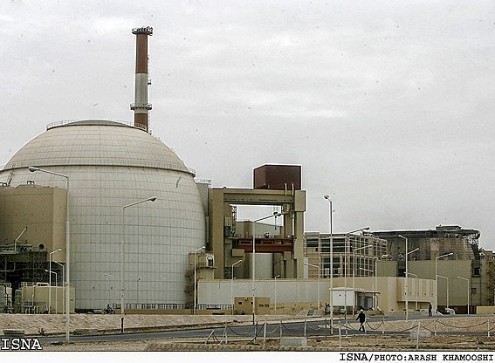
Could New Russian Nuclear Reactors Help Resolve the Iran Nuclear Problem?
On Tuesday, June 24, Iran stated its intention of signing a deal with Russia to build two new 1,000-megawatt nuclear reactors next to the first unit of the Bushehr nuclear power plant. Ali Akbar Salehi, head of Iran’s atomic energy organization, is slated to fly to Moscow at the end of August to finalize this contract, with construction of the reactors beginning as early as March of next year.
According to the Arms Control Association (ACA), a Russian deal will likely be accompanied with another 10-year fuel contract. Theoretically, this could help in bolstering confidence in Iran’s intention for peaceful use of nuclear energy since Iran wouldn’t have the need to enrich their own fuel for these reactors. The uphill work, however, will be in the details and Russia’s ability to make their initiative part of the comprehensive solutions that the P5+1 are seeking. With talks resuming among the P5+1 and Iran on July 2 in Vienna, it’s worth considering whether a Russian buy-in could provide additional cooperation in reaching a comprehensive agreement.
The benefits of this might include:
- affording Moscow a powerful incentive to unite with Western powers in persuading Iran to fully cooperate with the IAEA
- opening a sustainable path for Iran toward commercial nuclear power development
- providing a clear peaceful-use rationale for Iran’s uranium enrichment program, especially for Iran’s steadily growing inventory of enriched uranium product (EUP)
Many remain skeptical of growing ties between Russia and Iran, since this could possibly undermine the international coalition behind sanctions and diplomacy with Iran. Reportedly, Moscow is still playing a constructive role in the talks but Putin’s policies and behavior as of late raise questions about Russia’s reliability. In fact, a senior Russian diplomat implied last month that heavy US and European pressure on Moscow over Ukraine could lead Russia to change its position in the P5+1 Iranian nuclear talks.
Although it’s not entirely clear whether this Russia-Iran nuclear reactor deal could help resolve the Iranian nuclear problem, it’s evident that Russia plays a crucial role in the P5+1 and Iran talks. Russia has the ability to either undermine Iran’s cooperation or to foster it.
Theresa Shaffer is a nuclear security researcher and intern at the American Security Project. She is a recent graduate of the University of North Texas with degrees in International Studies and French. You can follow her on twitter here: Theresa Shaffer






